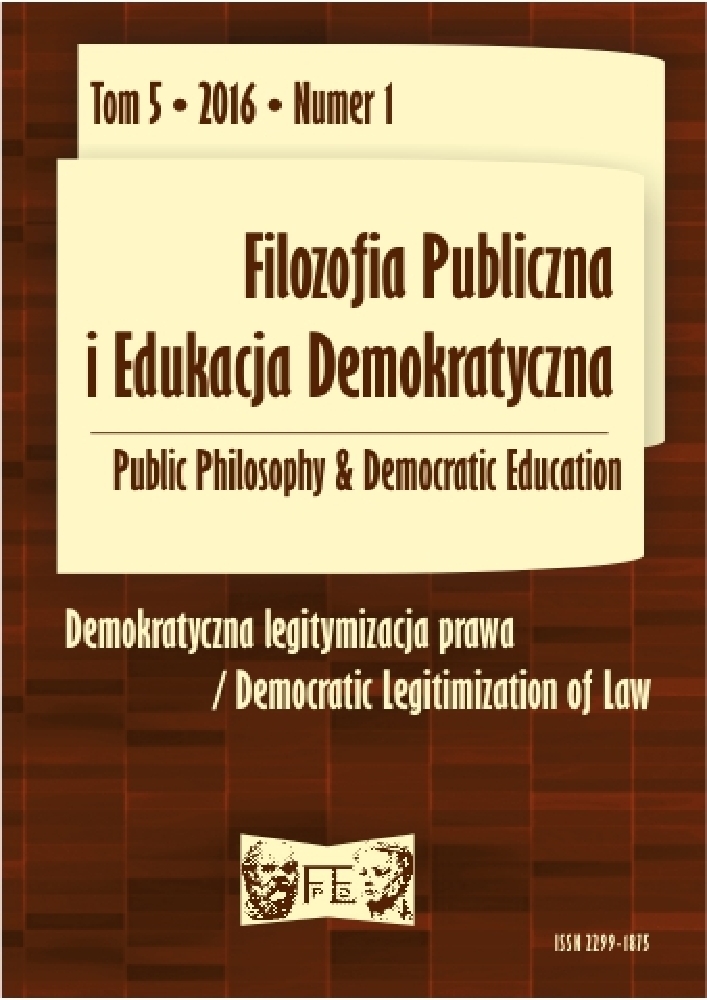Abstrakt
Constitutional review of legislation is the power to examine statutes for their conformity with the constitution. This competence is performed by the judiciary. The origins of this institution date back to XIX century and since that time constitutional review of legislation has became an important institution in most democratic states. In the paper, the author answers the most important charge raised against constitutional review – that it lacks democratic legitimacy. According to Jeremy Waldron, there is always a loss to democracy when a majoritian decision is overruled by a politically unaccountable court. As an answer to Waldron’s objection, the author introduces three arguments for the democratic status of constitutional review. These arguments point to three different sources of legitimacy for constitutional review: democratic will of the people, the principle of respect for the democratic reason, and substantial democratic values.Bibliografia
Ackerman Bruce A., We the People: Foundations, The Belknap Press of Harvard University Press, Cambridge MA 1991.
Bickel Alexander M., The Least Dangerous Branch: The Supreme Court at the Bar of Politics, Bobbs-Merill Co., New York 1962.
Bosek Leszek, Wild Mikołaj, Kontrola konstytucyjności prawa. Zagadnienia ustrojowe, procesowe i materialno prawne. Komentarz praktyczny, C.H. Beck, Warszawa 2014.
Christiano Thomas, „Waldron on Law and Disagreement”, Law and Philosophy, Vol. 19, No. 4, 2000 (ss. 513-543).
Dworkin Ronald, Freedom’s Law: The Moral Reading of the American Constitution, Harvard University Press, Cambridge MA 1996.
Eisgruber Christopher, Constitutional Self-Government, Harvard University Press, Cambridge MA 2001.
Elliott Mark, The Constitutional Foundations of Judicial Review, Hart Publishing, Oxford 2001.
Enoch David, „Taking Disagreement Seriously. On Jeremy Waldron’s Law and Disagreement”, Israel Law Review, Vol. 39, No. 3, 2006 (ss. 22-35).
Freeman Samuel, „Constitutional Democracy and the Legitimacy of Judicial Review”, Law and Philosophy, Vol. 9, No. 4, 1990-1991 (ss. 327-370).
Kavanagh Aileen, „Participation and Judicial Review: A Reply to Jeremy Waldron”, Law and Philosophy, Vol. 22, No. 5, 2003 (ss. 451-486).
Oliver Dawn „Is the Ultra Vires Rule the Basis of Judicial Review?”, in: Christopher Forsyth (ed.), Judicial Review and the Constitution, Hart Publishing, Oxford 2000 (ss. 3-28).
Perry Michael, The Constitution in the Courts: Law or Politics?, Oxford University Press, New York 1994.
Rawls John, Liberalizm polityczny, tłum. Adam Romaniuk, Wydawnictwo Naukowe PWN, Warszawa 1998.
Tuleja Piotr, Stosowanie Konstytucji RP w świetle zasady jej nadrzędności, Zakamycze, Kraków 2003.
Tushnet Mark A., „New Forms of Judicial Review and the Persistence of Rights- and Democracy-Based Worries”, Wake Forest Law Review, Vol. 38, 2003 (ss. 813-838).
Tushnet Mark A., Taking the Constitution Away From the Courts, Princeton University Press, Princeton 1999.
Waldron Jeremy, „Judicial Power and Popular Sovereignty”, in: Mark A. Graber, Michael Perhac (eds.), Marbury versus Madison: Documents and Commentary, Congressional Quarterly Press, Waszyngton 2002 (ss. 181-202).
Waldron Jeremy, „ Judicial Review and the Conditions of Democracy”, Journal of Political Philosophy, Vol. 6, No. 4, 1998 (ss. 335-355).
Waldron Jeremy, „Precommitment and Disagreement”, in: Lawrence A. Alexander (ed.), Constitutionalism: Philosophical Foundations, Cambridge University Press, Cambridge 1998 (ss. 271-299).
Waldron Jeremy, „The Core Case Against Judicial Review”, The Yale Law Review, Vol. 115, No. 6, 2006 (ss. 1346-1406).
Waldron, Jeremy, Law and Disagreement, Clarendon Press, Oxford 1999.
Licencja
Prawa autorskie (c) Autorzy zachowują prawa autorskie i prawa do publikacji swoich artykułów w tym czasopiśmie, przyznając czasopismu prawo do ich rozpowszechniania na warunkach CC BY-NC-ND 4.0
